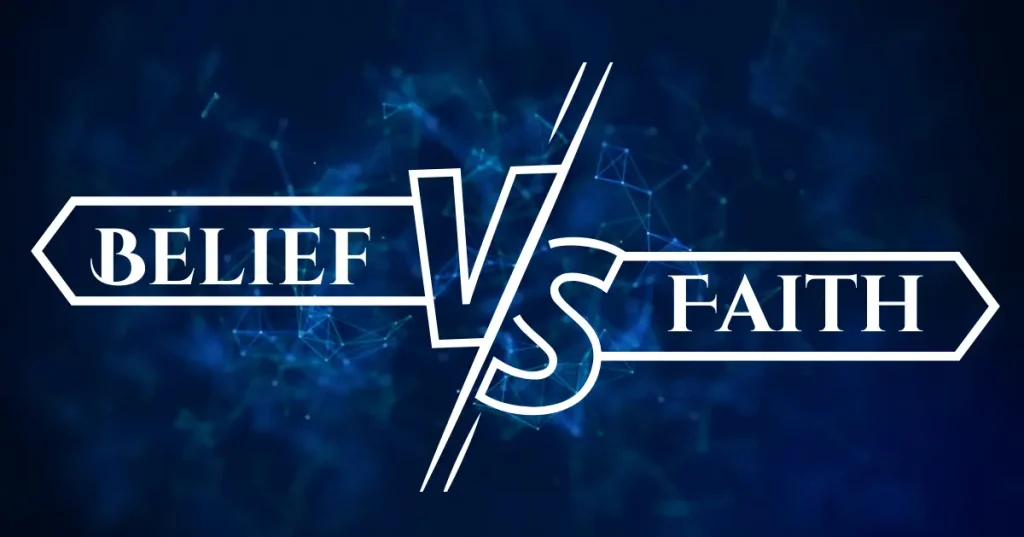Many of us wonder about the difference between belief vs faith. It’s important to know the unique qualities of each. Our choices in life depend on our beliefs and faith. These concepts shape how we see the world and make decisions.
Looking into belief and faith shows us how we see things and the role of evidence. The idea of belief vs faith is complex. Understanding it helps us value our own and others’ beliefs more.

Exploring belief vs faith reveals a not-so-clear line between them. Belief and faith affect each other deeply. Knowing their differences helps us understand ourselves and the world better.
Key Takeaways
- The difference between belief and faith is a complex and multifaceted topic.
- Belief vs faith is a dynamic interplay that influences our worldview and decision-making processes.
- Understanding the distinction between belief and faith can lead to a deeper appreciation of our values and those of others.
- The concept of belief vs faith is shaped by evidence and personal experiences.
- Examining the intersection of belief and faith can provide insight into the foundations of our existence.
- The relationship between belief and faith is essential to navigating our daily lives and making informed choices.
The Fundamental Nature of Belief and Faith
Exploring faith versus belief, we find key principles. Both shape how we see the world. They are closely linked but different in many ways.
Studies show evidence is key in both belief and faith. Belief relies on facts and reason. Faith goes beyond what we can see and touch.
Defining Belief in Modern Context
In today’s world, belief means using reason and evidence. We believe in physics because it’s proven many times. This shows how belief is based on solid facts.

Understanding Faith as a Concept
Faith is more complex. It’s about trust, loyalty, and commitment. It’s not just about facts but a personal feeling.
The Role of Evidence in Both Concepts
The debate on evidence in belief and faith continues. Belief leans on facts and logic. Faith is more about feeling and personal experience. Yet, faith’s evidence is unique and personal.
Historical Evolution of Belief and Faith
The history of belief and faith is complex. It’s important to know the difference between them. Philosophers, theologians, and scholars have debated this for a long time. Cultural, social, and religious factors have shaped their meanings.
Research shows key moments in the growth of belief and faith. Ancient times to now, belief is linked to evidence and reason. Faith is about trust and devotion. Some say belief is rational, while faith is emotional.

The line between belief and faith is not always clear. The comparison between them is complex and depends on the situation. Looking at their history helps us understand their importance today.
Also Read: The Difference Between Learning vs Education
| Period | Belief | Faith |
|---|---|---|
| Ancient | Tied to mythology and superstition | Associated with religious rituals and practices |
| Medieval | Influenced by philosophical and theological debates | Emphasized devotion and spiritual experience |
| Modern | Linked to scientific inquiry and rationalism | Focused on personal and emotional aspects of spirituality |
The Key Difference Between Belief and Faith: A Detailed Analysis
Exploring the difference between faith and belief is key. Belief often relies on evidence and reason. Faith, on the other hand, is deeply rooted in personal experiences and emotions. Both concepts are complex and influence each other in many ways.
Belief is closely linked to how we process information and evaluate evidence. Faith, though, is more about personal values and purpose. Knowing how faith and belief intersect can deepen our understanding of them.
| Concept | Cognitive Elements | Emotional Components |
|---|---|---|
| Belief | Evidence-based, rational | Confidence, conviction |
| Faith | Personal, experiential | Trust, devotion |
Looking into the contrast between belief and faith helps us understand them better. Recognizing their differences can make us more empathetic towards others’ views and experiences.
Psychological Perspectives on Faith and Belief
Research shows faith and belief affect our minds and feelings differently. Knowing the difference helps us understand their impact on our thoughts and actions.
Studies say faith gives us purpose and meaning, improving our mental health. Belief, on the other hand, is linked to thinking and making decisions. This knowledge helps us balance our mental and emotional health better.
Learn More: Gross Profit vs Net Profit: Key Differences Explained
Emotions play a big role in faith and belief. Faith brings joy, peace, and comfort. Belief is more about thinking and reasoning. This difference affects how we feel and act.
| Aspect | Belief | Faith |
|---|---|---|
| Cognitive Process | Reasoning, decision-making | Emotional experience, intuition |
| Emotional Impact | Influences attitudes and behaviors | Provides sense of purpose and meaning |
In conclusion, understanding faith and belief is key. Recognizing their differences helps us care for our mental and emotional health better.
Cultural Impact on Belief Systems versus Faith Traditions
The way we see the world is shaped by culture. When we look at faith and belief, culture matters a lot. It affects how we see things.
Western Interpretations
In Western cultures, faith is linked to organized religion. The lines between faith and belief can blur. But in the West, being individual and rational is key.
Eastern Perspectives
Eastern cultures focus on spiritual practices and personal experiences. Their faith or belief system is more than just a set of rules. It’s a way of life that includes philosophy and community.
Modern Secular Views
Modern secular societies value reason and science over faith. Here, faith and belief are not as sharply divided. Yet, faith and belief systems are important for a sense of community and shared values.
| Cultural Perspective | View of Faith and Belief |
|---|---|
| Western | Often associated with organized religion, emphasizes individualism and rational thinking |
| Eastern | More holistic, incorporates spiritual practices, philosophy, and community |
| Modern Secular | Prioritizes reason and science, encourages critical evaluation of beliefs |
Practical Applications in Daily Life
Knowing the difference between belief and faith changes how we live. It helps us make better choices, grow personally, and connect with others. Faith and belief guide us in facing challenges and seizing opportunities.
Read More: Myth vs Fact: Exploring the Difference
Belief vs faith shapes our view of the world and our actions. Understanding evidence and emotions in belief and faith helps us know ourselves and our surroundings better. This leads to smarter choices and a clear purpose.
Decision-Making Processes
In our daily lives, belief and faith guide our choices. We think about evidence and our feelings to make better decisions. This is key when we’re unsure or don’t know what to do.
Personal Development
Belief and faith also shape our personal growth. By exploring our beliefs and faith, we learn more about ourselves and our values. This self-knowledge helps us set goals and find our purpose.
Relationship Building
The difference between belief and faith also affects our relationships. By understanding and respecting others’ beliefs and faith, we build stronger bonds. This is very important in diverse communities where different beliefs and faiths exist.
| Concept | Definition | Practical Application |
|---|---|---|
| Belief | Mental acceptance of a concept or idea | Informed decision-making, critical thinking |
| Faith | Emotional commitment to a concept or idea | Personal development, relationship building, sense of purpose |
Scientific Research on Belief vs Faith
Research has shown us a lot about belief and faith. It’s a complex topic, with many fields studying it. Psychology, neuroscience, and philosophy all have their own views.
Scientists have looked at the brain to understand belief and faith. They’ve found certain brain areas light up during religious activities. This helps us see how faith and belief affect our actions and choices.
They’ve also linked faith and belief to mental health. People with strong beliefs and faith often handle tough times better. This shows faith and belief can make us happier and more resilient.
The relationship between faith and belief is complex and multifaceted, and scientific research has only begun to scratch the surface of this fascinating topic. As we continue to explore the intricacies of faith versus belief, we may uncover new insights into the human experience and the ways in which we find meaning and purpose in life.
Conclusion: Bridging the Gap Between Belief and Faith
As we wrap up our look at belief and faith, it’s clear they’re different but connected. Belief uses our minds and evidence. Faith goes deeper, touching our hearts and spirits.
We’ve looked at how these ideas have changed over time and how they affect us. Understanding the differences helps us see how people find their way in the world. It shows us the many ways we make sense of life.
The key is to see belief and faith as parts of our whole experience. By valuing both, we grow in understanding. We learn to appreciate the variety of human thought and spirit.
FAQ
What is the difference between belief and faith?
Belief and faith are often mixed up, but they mean different things. Belief is when you think something is true because of evidence or your own experience. Faith is a deeper feeling of trust in something, even without proof.
Is faith the same as belief?
No, faith and belief are not the same. Belief is when you think something is true. Faith is a strong trust in something, like a higher power.
What is the distinction between belief and faith?
Belief is based on reason and evidence. Faith is more about personal trust and spiritual connection. Belief changes with new information, but faith stays strong.
How do belief and faith differ?
Belief and faith are different in many ways. Belief uses reason and evidence. Faith is about personal trust and spiritual connection.
Belief can change with new information. Faith stays strong. Belief is more thinking, while faith is emotional and spiritual.
What is the relationship between belief and faith?
Belief and faith are complex and connected. They can influence each other. Belief can strengthen faith, and faith can shape beliefs.
But they are not the same. They can work on their own too.



